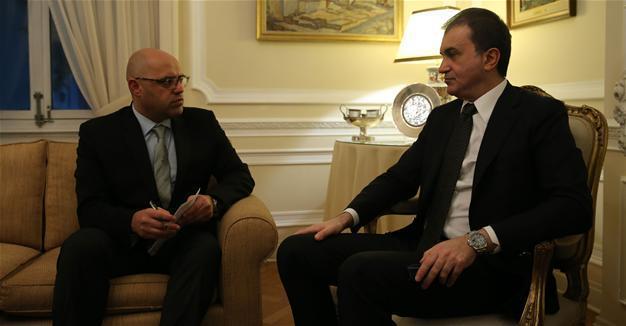Turkey vows to extend state of emergency ‘until threat is fully eradicated’
SERKAN DEMİRTAŞ - ATHENS

The Turkish government has signaled a long-term implementation of the state of emergency, with EU Minister Ömer Çelik saying it will continue throughout the struggle against coup plotters and describing it as the only mechanism to “fully eradicate the threat posed by the Gülenists.”
“We have no luxury to take risks and leave the issue be resolved on its own. It’s clear that we should continue until we are sure they are fully rooted out. The state of emergency is an essential mechanism to this end. You can’t fight them with any other mechanism,” Çelik told journalists accompanying him on his trip to Athens on Nov. 2 and 3.
Ankara declared a state of emergency right after the July 15 coup attempt and extended it after the initial three months. The existing state of emergency will expire in late January 2017, but Çelik’s words indicate the government’s plan to extend it for an indefinite period of time.
He stated that new discoveries about what the government and prosecutors call the Fethullahist Terror Organization (FETÖ) were made during the ongoing probes, prompting new dismissals from state bodies including the military.
“What these coup plotters did stands before us as a clear picture … Of course, let’s not live in paranoia. But we should also not be naïve,” Çelik said.
EU ‘left us alone’ On ongoing discussions about reinstating the death penalty, which could severe ties between Ankara and Brussels, EU Minister Çelik echoed the government’s line but underlined the importance of “following the process” and stressed that political and technical work on the issue would continue for some more time.
“At the end of the day, the people are the boss of the politician. Politicians need to heed the people’s demands,” he said, while criticizing the EU’s “weak support” for the Turkish government after the coup attempt.
“The EU left Turkey alone after the coup attempt. This had an impact on the people’s approach [to voicing the death penalty]. It has been months since the coup attempt and the president of the European Commission has still yet to visit to Turkey. It should be remembered that one of the most important reasons why the Turkish people have supported the EU process was in order to guard against potential coups and the tutelary regime,” Çelik said.
Detention of Cumhuriyet scribesThe detention earlier this week of the editor-in-chief of daily Cumhuriyet and more than a dozen of its journalists and executives sparked fresh tension between Ankara and Brussels, with European Parliament President Martin Schultz describing the move as “another red line crossed” on freedom of expression.
Çelik said he recognized his EU counterparts’ right to criticize Ankara, but lashed out at the “tone” Schultz and others have used.
“The kind of tone in their statements [on the Cumhuriyet case] was not heard in relation to the coup attempt. What’s more, they do not even follow principles on media freedom: They raise their voice when it relates to journalists with whom they are in contact, but they do not follow this line on journalists with different ideological backgrounds,” he claimed.
“For us, our elected president is the symbol of the unity of the state. Using disrespectful language against him is our red line,” Çelik added.
EU makes fresh proposal for visa waiverHe also addressed recent developments on negotiations over Brussels granting visa liberalization to Turkish nationals in return for implementing the Readmission Agreement on refugees, a process that has been stalled due to disagreement on the definition of terrorism.
“They have sent us a new paper. We are analyzing this. Next week we’ll have a meeting with our interior, justice and foreign ministers. If the paper still insists on a change to our anti-terror laws, we won’t accept it. The process will be dead if there is no new picture. Then we’ll annul the Readmission Agreement,” Çelik said.
‘Chapters 23 and 24 should be opened’ On Turkey’s EU membership negotiation process, Ankara’s rising pressure on freedom of the press is among the reasons why the opening of new accession chapters has been stalled.
“They talk about freedom of the press, freedom of expression. We tell them, ‘You are talking without knowing the content of these cases. We show no hesitancy. Let’s open chapters 23 and 24 and discuss these issues openly and in a concrete way,” Çelik said.
Chapters 23 and 24 on the judiciary, freedoms and other key issues, are currently under blockage by Greek Cyprus.
‘CHP should push for presidential system’Meanwhile, Çelik also rejected opposition criticism that the government is seeking authoritarian powers through the adoption of an executive presidential system.
“If we wanted more power, we should not be pursuing the presidential system but stick with the current system. After all, the [main opposition Republican People’s Party] CHP will never be able to come to power in this current system. So in fact it should be the CHP that is pushing for the presidential system,” he said.
 The Turkish government has signaled a long-term implementation of the state of emergency, with EU Minister Ömer Çelik saying it will continue throughout the struggle against coup plotters and describing it as the only mechanism to “fully eradicate the threat posed by the Gülenists.”
The Turkish government has signaled a long-term implementation of the state of emergency, with EU Minister Ömer Çelik saying it will continue throughout the struggle against coup plotters and describing it as the only mechanism to “fully eradicate the threat posed by the Gülenists.”